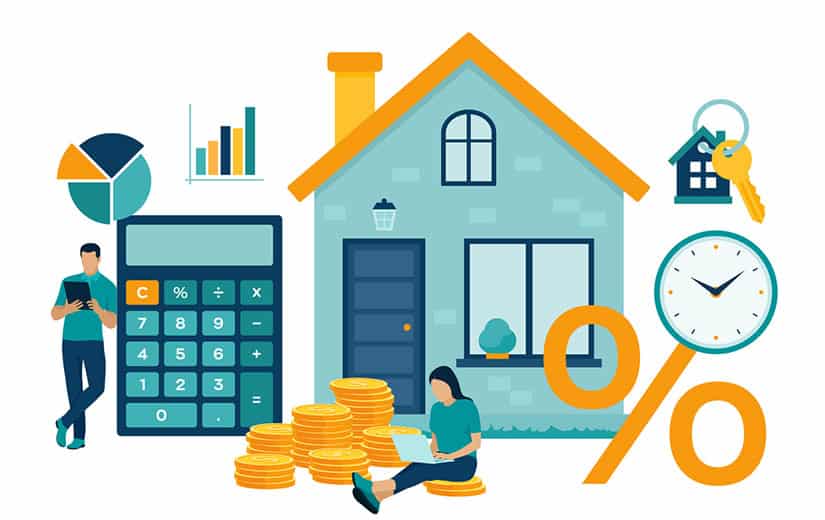You took out a joint mortgage before you divorced. What happens to the current mortgage? And how does the repurchase of credit represent an ideal solution in the event of separation? Finally, what happens to a purchase of credit subscribed in common after a divorce? Discover all the possible scenarios depending on the marriage contract and your situation, and the steps to take. Also follow our advice to avoid disputes.
Summary
What happens to a mortgage after a divorce?
You should know that a divorce does not make disappear a mortgage taken out by two. Indeed, there is the solidarity clause. Provided for in the contract, it involves the responsibility of the co-borrowers. Therefore, both are obligated to pay the entire loan. And this, regardless of the established marriage contract. Article 230 of the Civil Code stipulates that the spouses must establish an agreement defining the consequences of the divorce.
Under the regime of community reduced to acquests (the most common)
If the marriage was pronounced under the regime of reduced community of acquests, real estate acquired during the marriage belongs to both spouses (except donation or inheritance). The two ex-spouses must share the property equally, even if one of the two has participated more in the financing.
Under the separation of property regime
In the case of the separation of property regime, the respective assets are separated. If you bought a property together, you will be subject to the rules of joint ownership in the event of a divorce. Each is therefore the owner in proportion to his contribution. In other words, if you divorce, the property will have to be divided according to the contribution.
Possible scenarios
But the fate of the mortgage also depends on what the two ex-spouses want to do with it:
- neither wants to keep the house or the apartment. The property will therefore be put up for sale and the two spouses will have to pay the monthly installments until the said sale is concluded. Then, the notary will repay your mortgage and determine the share due to each, according to the established marriage contract. And if the sale is not enough to cover the balance of the current loan, it obviously remains due;
- one of the two wishes to keep the property. It is therefore necessary that the one who wishes to keep the good buys back the share of the other. He must have sufficient solvency and obtain the agreement of the bank to take over the loan entirely at his expense. A notary will also intervene to record the transfer of the shares and modify the title of ownership of the property;
- the couple keeps the property together, this supposes a good understanding. You should notify your bank of the new situation, but solidarity will be maintained to repay the current credit.
The steps after a divorce and repurchase of credit
In the event of divorce by mutual consent, if one of the two wishes to keep the property, it is necessary to settle the allocation of housing and in particular the payment of a balance. This step is essential when the ex-spouse wants to buy out the other’s share. The cash payment refers to the sum paid to the co-owner of the property who sells his share. It is compensation for his loss of assets.
It should be noted that a compensatory amount in capital can also be requested from the spouse who becomes the sole owner for compensation.
And when these changes are accompanied by a need to reorganize finances, a credit consolidation project can be considered.
This banking operation consists of grouping several current credits into one in order to reduce the monthly payment. This also implies an extension of the repayment period. Balance financing can therefore be integrated into a collection of loans. This option facilitates the procedures before the judge responsible for validating the agreement.
To know : so that neither of the two parties feel aggrieved in the estimation of the property, it is better to call on a real estate expert. Thus, this estimate will make it possible to determine the amount of the repurchase of balance.
The repurchase of credit, an effective solution in the event of divorce?
In the event of separation, the repurchase of credit represents the ideal solution because it allows borrowers to consolidate their old credits under a single monthly payment. Both parties can thus rearrange their debts.
And if necessary, if the income allows it, this solution can authorize the financing of a new project or cash to face unforeseen expenses. In addition, the repurchase of credit proves to be a solution to regain a financial balance.
Repurchase of credit after a divorce: the procedure to follow
The first step is to request a loan separation from your lending bank. The establishment has the right to refuse if it considers that you are unable to repay the credit alone. In this case, the best solution is to request a full redemption of the credit to adapt the monthly payment as well as the repayment period.
Attention, to the amount of the repurchase of credit are added other expenses such as the expenses of notary, expenses of separation and possible expenses of prepayment.
When the repurchase of credit is effective, the new credit only includes the name of the sole owner. The monthly payments to be repaid are therefore adapted to his income. And the property becomes his full ownership.
What happens to the repurchase of credit after a divorce?
Let us now consider another scenario. You subscribed to a joint credit buy-back before your divorce, what becomes of the operation?
In this case, the bank that has established a loan buyback for you may demand reimbursement of the amount due as soon as the divorce is pronounced. To achieve this, the two parties will be able to take out a loan individually in order to fully repay their joint debt.
The other possibility is to pay back half of the remaining debt to her ex-spouse. This allows you to no longer have to repay. And the former spouse will take the rest of the monthly payments.
But to avoid any conflict, and even if a good understanding reigns within your former couple, it is strongly recommended to make these financial arrangements with a notary.
Read also: Can buying back credits help you get out of debt?




